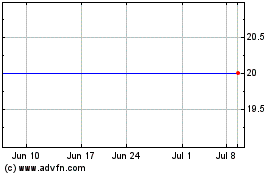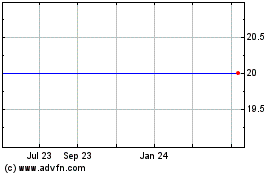U.S. Stocks Slip as Trade War Weighs on Chinese Exports
December 09 2019 - 3:12PM
Dow Jones News
By Paul J. Davies and Paul Vigna
U.S. stocks slipped Monday after fresh economic data showed a
sharp decline in Chinese exports to the U.S., highlighting the
impact of the trade war between the world's two largest
economies.
The S&P 500 fell 0.2%, while the Dow Jones Industrial
Average lost 0.3% and the Nasdaq Composite dropped 0.2%.
The muted moves opened what some analysts said could prove to be
a pivotal week for markets. Friday's jobs report eased a lot of
concerns about the strength of the U.S. economy. But this week's
calendar includes updates on trade, politics and central-bank
policy around the world that could shift the direction of asset
prices.
"What happens this week decides what goes on from here," said
Bethel Loh, a market strategist at ThinkMarkets.
Trade policy remained a major concern for investors after data
Sunday showed China's exports unexpectedly dropped 1.1% in November
from a year earlier, while shipments to the U.S. fell 23%,
according to China's General Administration of Customs. Uncertainty
about the trade talks between the two nations has weighed on global
trade and the economic outlook for much of this year and made
investors jittery.
With a new round of tariffs poised to go into effect Sunday on
imports from China, a commerce-ministry official said Monday that
China hopes trade negotiations with the U.S. will result in a
"satisfactory" outcome as soon as possible. Some analysts expect
Mr. Trump to delay imposing new tariffs while negotiators are
pursuing a deal. His economic adviser, Larry Kudlow, said Friday
that there were "no arbitrary deadlines" to complete a limited
trade deal.
"Avoiding a total breakdown remains the most important outcome
for investors," said Geoffrey Yu, head of the U.K. investment
office at UBS Wealth Management. "Expectations are somewhat
contained, so even if there is something before the 15th, it may
not herald a new bull market or unleash an upswing in investment
and/or GDP growth globally."
Beyond the trade talks, the Federal Reserve and European Central
Bank both have key policy meetings. In the case of the Fed, nobody
expects major changes in policy. For the ECB, investors are
watching to see how Christine Lagarde sets the tone in her first
meeting as president.
Politics could also move markets. In the U.S., Congress
continues its impeachment inquiry into President Trump. In the
U.K., Britain prepares to vote in Thursday's crucial general
election, which will set the country's course for how or whether it
leaves the European Union. Polls suggest the ruling Conservative
Party is set to win, though a recent narrowing of the lead is
enough to keep the outcome uncertain. The FTSE 250 index of stocks
dropped 0.4%. The pound rose 0.1% to $1.315, its highest since
April.
On Monday, the Fed injected another $81.4 billion in short-term
liquidity to financial markets, continuing a program it began in
mid-September when the overnight-lending market, called the repo
market, began to see unexpectedly high rates. While the Fed's
actions have brought the market in line, it hasn't fixed it, and
the problems show traders are still acutely concerned with all of
the same issues they were at the beginning of the year, said
Mohamed Zidan, chief market strategist at ThinkMarkets. They don't
see a quick resolution to them, either.
"There is the anticipation of a lot of volatility next year," he
said.
In U.S. stocks, shares of Merck fell 0.2% after it agreed to
acquire ArQule for $2.7 billion. ArQule shares rose 104%.
Netflix shares fell 0.6% after the streaming company dominated
the Golden Globes awards nominations with 17, more than double the
top-nominated studio, Sony Pictures.
The Stoxx Europe 600 ticked down 0.2%. Tullow Oil was the
biggest loser on Monday. The stock dropped more than 60% after the
energy company cut production forecasts and its chief executive
resigned, effective immediately.
Elsewhere in Asia, the Nikkei Stock Average rose 0.3% after data
showed the Japanese economy grew faster than expected in the third
quarter. Gross domestic product expanded by an annualized 1.8% in
the three months ended Sept. 30, surpassing a preliminary official
estimate of 0.2%.
Write to Paul J. Davies at paul.davies@wsj.com and Paul Vigna at
paul.vigna@wsj.com
(END) Dow Jones Newswires
December 09, 2019 14:57 ET (19:57 GMT)
Copyright (c) 2019 Dow Jones & Company, Inc.
ArQule (NASDAQ:ARQL)
Historical Stock Chart
From Mar 2024 to Apr 2024

ArQule (NASDAQ:ARQL)
Historical Stock Chart
From Apr 2023 to Apr 2024
